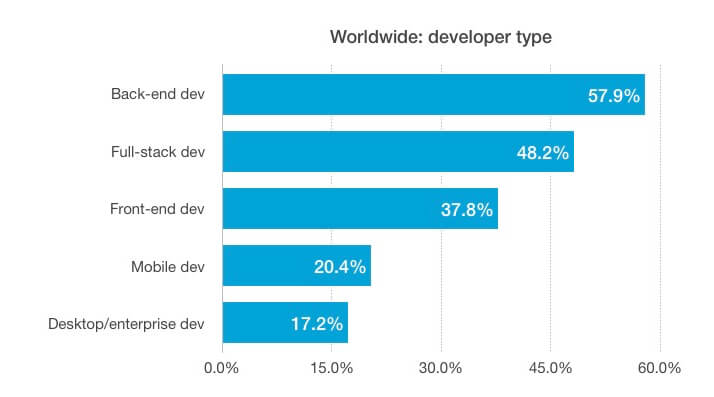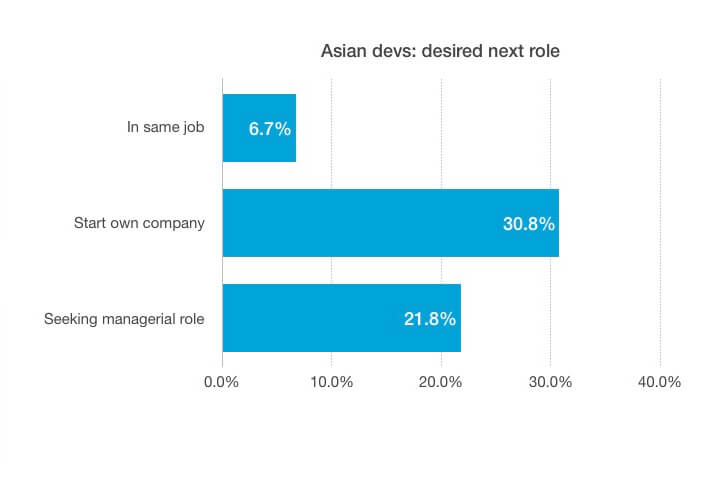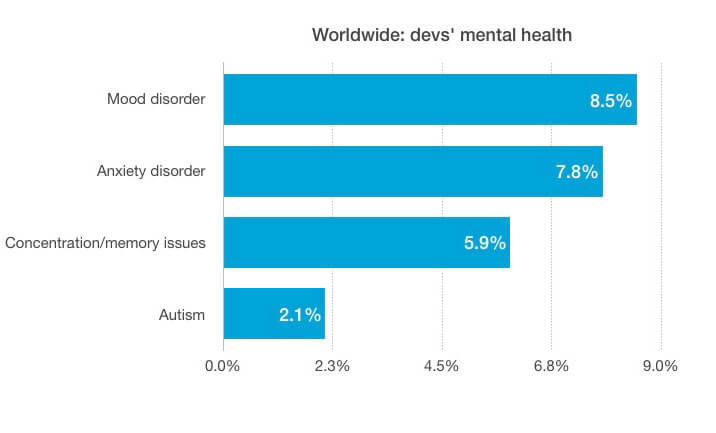
The results of the Stack Overflow developers’ survey 2018 are now in. Source: Shutterstock
How to hang onto your developers in a seller’s market
THE eighth annual Stack Overflow developer survey has revealed some results about techs based in Asia which employers and employers-to-be might do well to take notice of.
Each year stackoverflow.com takes an extensive survey of its development community. Stack Overflow is one of the gamut of tools and resources which, like GitHub, are used just about every day by most professional developers, and indeed, many hobbyist developers.
Over 100,000 developers took the survey this year, among them 20,000 developers based in Asia: from the Indian subcontinent, Malaysia and Singapore, Japan, Korea, China, Taiwan and Hong Kong, as well as the Philippines, Myanmar, Vietnam and Thailand.
The majority of developers identified themselves as backend developers (57.9 percent), or full stack/front-end developers (48.2 percent/37.8 percent respectively), closely followed by mobile developers at 20.4 percent of those surveyed. This last statistic is significant when compared to the 17.2 percent of developers who identified themselves as desktop or enterprise application developers – reflecting the high overall level of emphasis placed on mobile apps by business users and consumers alike.

The majority of developers based in Asia are employed full- or part-time, with only around 25 percent working as pure freelancers.
Of the two employment models, freelancers generally seemed less dissatisfied with their careers with only 186 either slightly or extremely dissatisfied with their careers to date.
Among the employed staff, 15.8 percent were either slightly or extremely dissatisfied with their job.
Regarding their careers as a whole, around 42 percent of Asian employed developers were “slightly satisfied” or “extremely satisfied” to date.
Before employers can give themselves a hearty round of applause for their superlative work in providing exciting, stimulating, and rewarding workplaces for their development teams, it is interesting to note that only 1,366 of those surveyed based in Asia saw themselves doing the same job in five years time (6.7 percent).
Just over 60 percent are either actively looking for a new job or would be interested if a fresh job opportunity presented itself. Most Asian devs are sticking with their chosen career in code-land, with only 2.3 percent stating that they were looking to do the career equivalent of running away to join the circus.
Around 3,700 of the c.12,000 with itchy feet were looking to start their own company, more than the 2,616 who would like a promotion to managerial status in their existing organization, or in the next one.

The survey went on to ask developers which particular things about any new role would interest them most. The standout statistics of those 12,000 considering jumping ship included 4,849 who said that the languages or framework in which they are expected to work were very important, while an almost equal number, 4,834, said that the potential for professional development (a.k.a. training possibilities) was their most significant influence in considering a new role favorably.
And while developers traditionally rely on and value peer review, 62 percent also placed salary or other bonus schemes very high on the list.
Only 10 percent stated parental leave is vital with similar numbers also favoring a gym, free snacks or a decent canteen.
Of the 100,000+ surveyed across the world, the vast majority are male (92 percent), heterosexual (93 percent), and suffering from levels of stress and mental illness at around average levels (although more so in the US than any other country).

Employers wishing to gather up the next generation of developers may be interested to learn that the best way to approach potential new employees is through a private email address, message on a job site or through social media.
Fewer than 10 percent of those surveyed regarded an email through their current employer-provided work account to be acceptable (or wise, presumably).
The global survey results (available in full here) show a wide range of current incomes, ranging from a few dollars a year garnered on a freelance basis by hobbyist developers, up to a few lucky souls who quoted their incomes as around US$2 million per annum!
After ignoring the wild outliers in the income stats, pay rates seemed to begin at around US$7,000 (paid on the Indian subcontinent) up to salaries well into six figures; typically the top end is around the $200,000 mark, enjoyed by just a few US-based devs.
The average developer income in Asia was US$26,442, paid in local currency (converted to US dollars at the time of the survey results’ collation).
For employers looking for guidance on attracting the best developers to a workforce, this author would advise the following:
- Provide professional development or training – it’s highly valued. In fact, around 83 percent of professional developers also code “for a hobby.” To many, therefore, coding is all-encompassing, not just a 9 to 5. Courses in Rust will probably prove popular – it’s the most well-regarded language according to the survey.
- Pay well — salaries, bonus schemes, health care, health insurance are all valued more highly than the provision of free snacks, access to a gym, or a pile of shiny new hardware on which to work. But on the latter point, note most developers use two monitors+ as standard. This may seem trivial, but monitor space is devs’ literal workspace, and they spend a good number of hours staring at them.
- Create a career ladder – many regard their progress up the ranks an attractive goal, with managerial promotions valued highly. Those not thus rewarded are more than happy, it seems, to go and take part in the next wave of APAC start-ups than sticking around waiting to be recognized.
- Don’t rely on people hanging around — with around 60 percent of respondents from Asia actively looking for, or willing to consider a new role, employers have to provide something really quite special to keep valued employees.
For the young, skillful and ambitious developer, the work marketplace is an exciting and productive place to be.
With blockchain developers reputedly earning salaries of up to US$1 million per annum (according to current internet rumors), and artificial intelligence coding skills in extraordinarily high demand, developers are operating in a seller’s market.
READ MORE
- Ethical AI: The renewed importance of safeguarding data and customer privacy in Generative AI applications
- How Japan balances AI-driven opportunities with cybersecurity needs
- Deploying SASE: Benchmarking your approach
- Insurance everywhere all at once: the digital transformation of the APAC insurance industry
- Google parent Alphabet eyes HubSpot: A potential acquisition shaping the future of CRM
